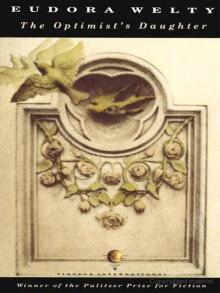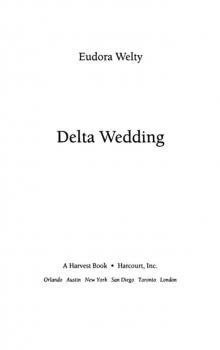- Home
- Eudora Welty
Delta Wedding Page 9
Delta Wedding Read online
Page 9
They played "Running Water, Still Pond," "Fox in the Morning, Geese in the Evening," and then "Hide-and-Seek." Once Lady Clare was It, because she was carrying a little Chinese paper fan that folded back on tiny sticks, then Shelley was It again. Laura ran to her best hiding place, down on the ground behind the woodpile in the back yard. She waited a long time crouched over and nobody came to find her. From where she hid she could see the back of the house, hear the Negroes, and upstairs on the long sleeping porch she could see Uncle George walking up and down, up and down, smoking his pipe. She listened to the dark, dense rustling of the fig trees, and once she put a straw down a doodlebug hole and said the incantation in a very low voice.
Then she saw Maureen running by, and Maureen saw her. With a leap Maureen was up on her woodpile. She did not say a word. She looked over from the top, and then after a strange pause, as if she could think, she pushed the whole of the piled logs down on Laura, upsetting herself too."Choo choo," said Maureen, and then she ran away.
Laura at first was surprised, and then with great effort she began to extricate herself. The surprise, the heavy weight, and the uncertainty of getting out kept her so busy that at first she did not miss them coming to look for her. She had on her next-best white dress, and long tears showed in it, and long scratches marked up her legs and arms. She had the taste of bark in her mouth and kept spitting on the ground, though the taste was still there. Inside the house the light, tinkling sounds went on; Roxie's high laugh, like a dove cry, rose softly and hung over the yard. And from farther away the sigh of the compress reminded her of Dabney, who had gone somewhere.
Harm—that was what Maureen intended, that was what she meant by her speechless gaze. That was what made her stay so close to them all, what drove her flying over the house, over the fields that way, after the others. That was what put extra sounds in her mouth. It was the harm inside her.
"She likes to spoil things," India had explained matter-of-facdy, and matter-of-factly Laura had accepted it. But the cousins were a clan. They all said things, and they all kissed one another, and yet they all had secret, des-piting ways to happiness. At hide-and-seek a trick could be played on Laura, for she was still outside. She herself would never mean from the start to push down and overwhelm, or withhold any secret intention or hope in relish and delight.
Pushing the heavy logs from her, she felt shorn of pleasure in her cousins and angry in not having known that this was how the Fairchilds wanted things to be, and how they would make things be, when it pleased them. Uncle George was nowhere to be seen, and she thought she heard Shelley laughing and calling his name down in the house. A feeling of their unawareness of her came over Laura and crushed her more heavily than the harm of Maureen and the logs of wood, and she thought surely her mother would cry in Heaven to see her now, if she had not cried so far.
She licked the blood away clean from her arms, and looked at her knees to see if some old scabs had come off—yes. She was as black and ugly as a little Negro. She tied her sash tight around her hips. Without looking up she crept around the yard, with her locket in her mouth, around the cistern on her hands and knees, keeping low not to be seen, her feet dragging numbly. Under the snowball bush she hit both feet with her fists until she could feel the sting, and then, picking all the cinders one by one out of her elbows and skirt and out of her Roman sandals, she walked around the house and darted in to Home, which was the trunk of a tree, without being caught.
At that moment, touching Home, her finger to the tree, she was not happy, not unhappy. "Free!" she called, looking around, not seeing the others anywhere, but she had them every one separate in her head.
Then she saw Uncle George walk out of the house and stare out into the late day. She wanted to call out to him, but something would not let her. Something told her, ever since the look he gave her, that it was right for him to stand apart, and that when he opened an envelope in a room no one should enter. Now she felt matter-of-factly intimate with it, with his stand and his predicament. She thought of herself as growing up beside Uncle George, the way some little flowers and vines have picked their tree, and so she felt herself sure of being near him. She knew quite objectively that he would not disown her and uproot her, that he loved any little green vine leaf, and now she felt inner warnings that this was a miracle of safety, strange in any house, and in her this miracle was guarded from the contamination even of thinking.
As if by smell, by the smell of his pipe, she knew that he out of all the Delta Fairchilds had kindness and that it was more than an acting in kindness, it was a waiting, a withholding, as if he could see a fire or a light, when he saw a human being—regardless of who it was, kin or not, even Aunt Ellen, to whom he called and waved now—and had never done the first thing in his life to dim it. This made him seem young—as young as she. On the other hand, when all night she could hear coming up the dark stair well his voice soft and loud with Uncle Battle's bark after it, chasing, she gathered that he was hard to please in some things and therefore old. Uncle George and Uncle Battle would argue or talk until Uncle Battle hollered out the window for Roxie or Ernest to come up to the house and fix them their nightcaps.
She stored love for Uncle George fiercely in her heart, she wished Shellmound would burn down and she could run in and rescue him, she prayed for God to bless him—for she felt they all crowded him so, the cousins, rushed in on him so, they smiled at him too much, inviting too much, daring him not to be faultless, and she would have liked to clear them away, give him room, and then—what? She would let him be mean and horrible—horrible to the horrible world.
Would she? She leaned her forehead against the tree, with some shimmering design about him in her head coming like a dream, in which she was clinging, protecting, fighting all in one, a Fairchild flourishing and flailing her arms about. Of course it was all one thing—it was one feeling. It was need. Need pulled you out of bed in the morning, showed you the day with everything crowded into it, then sang you to sleep at night as your mother did, need sent you dreams. Need did all this—when would it explain? Oh, some day. She waited now, and then each night fell asleep in the vise of India's arms. She imagined that one day—maybe the next, in the Fairchild house—she would know the answer to the heart's pull, just as it would come to her in school why the apple was pulled down on Newton's head, and that it was the way for girls in the world that they should be put off, put off, put off—and told a little later; but told, surely.
Uncle George came down the steps and walked slowly over the fresh-cut grass, not seeing her for she was behind the big pecan tree. All his secret or his problem, or what was in the blue letter, though she did not know what it was, was sharp to her to see him go by, weighty and real and as cutting (and perhaps as filled with dreaded life) as a seashell she had once come on, on the seashore, and unwittingly seized.
"Don't cry out here, Laura," said a soft voice.
It was Little Battle, in his overalls. He poked a cold biscuit with a little ham in it into her mouth, and because she was startled stood by while she swallowed it. Then they ran into the house. "Oh, Little Battle!"
IV
Laura wanted so badly to be taken to their hearts (never wondering if she had not been, at any time before her own wish) that she almost knew what the Fairchilds were like, what to expect; but her wish was steadier than her vision and that itself kept her from knowing. Ellen saw it.
While she held supper for Dabney, late now at some bridesmaid's party, Ellen had walked out in the yard to feel the cool. It was first-dark, and the thrushes were singing tirelessly from the trees. She had walked through the yard where the children were playing and Vi'let was gathering in the curtains, past the flower beds, down toward the bayou. The evening was hot; it was the fragrance of the lemon lilies that was cool, like the breath from a mountain well. From the house came a momentary discord on the piano keys. That was Shelley passing through the music room, putting her hands down over Mary Lamar Mackey's. Then the slow, dwelling me
lody went on.
Ellen looked down the road for Dabney. Stretching away, the cotton fields, slowly emptying, were becoming the color of the sky, a deepening blue so intense that it was like darkness itself. There was a feeling in the infinity of the Delta that even the bounded things, waiting, for instance, could go on forever. Over and over from the bayou woods came the one high note, then the three low notes of the dove.
At her feet the bayou ran, low, long since cleared of trees here, and all but motionless. She thought it was like a mirror that was time-darkened, no longer reflecting very much, but an entity in itself. She remembered old, disparaging Partheny when she got to her, going so ill-advised on foot. In Partheny's house in Brunswicktown she had bent over the cot where the old woman lay out straight with her long toes pointing up and her eyes looking at the ceiling. "Partheny, do you hear me? Are you in a spell, Partheny?" Partheny was her nurse when her oldest children were little.
"Oh, I done had it," Partheny had said. "It over by this time. I were mindless, Miss Ellen. I were out of my house. I were looking in de river. I were standing on Yazoo bridge wid dis foot lifted. I were mindless, didn't know my name or name of my sons. Hand stop me. Mr. Troy Flavin he were by my side, gallopin' on de bridge. He laugh at me good—old Partheny! Don't you jump in dat river, make good white folks fish you out! No, sir, no, sir, I ain't goin' to do dat! Guides me home. You can go on back now, go on back, Miss Ellen, to your little girl puttin' on her weddin' veil. But don't set your heels down! Go real still."
She heard someone coming from the house, and saw from the glimmer of white clothes and the tall strolling walk of "company" that it was George—he waved briefly. He looked thin. Poor boy, he had not even eaten any to speak of, of the good coconut cake she tried to tempt him with. The noise of the children made him bite his lip, and he did not like Mary Lamar Mackey, this time.
She had not even taken her apron off; she clasped her hands before her. But he untied the apron when he came and threw it over the branches of a little dogwood tree. "Forget everything out here," he said, and stood looking out.
"I saw a runaway girl in the bayou woods, George," she said, "a white girl. Going just as fast to Memphis as she could go. Purely loitering. I saw her peeping out from behind a tree, the prettiest thing ever made. I very ill-advisedly went to Brunswick-town on foot, by the short cut. There she was." She had never thought of mentioning the girl or seeing her. (Battle would say: "Ellen Fairchild, do you mean to tell me you've been out alone, a lone woman on foot, in these fields and woods? No gun either, I bet you all I've got.") But she was tired, and sometimes now the whole world seemed rampant, running away from her, and she would always be carrying another child to bring into it.
Now she saw by the dense evening light—for she always knew it when she saw it—a look on George's face that both endeared him to her and reminded her of all her anxiety for his comfort in life; the first source of the feeling, long ago, might have been that look—she did not know. It was only a tender change of countenance, a smile—but it looked like the vanishing of suspense. There was gratification and regret in it, at something you said. It was as if he had known life could not go on without this thing—now, like a crash, a fall, it had come. So you, having begun, without knowing it, some unfinished story to him, would then tell everything, perhaps. She never altogether understood George's abrupt, tender smile—yet without thinking she would often find herself telling the very thing that brought it to his face. It could not be amusement—for she had nothing funny about her, not a bone in her body. For instance, now—surely he could not be simply enjoying the idea of herself brought up against a wild runaway girl? For her heart still felt the strain. And certainly she knew he would not laugh at a girl that wanted to run away.
"Not far from here at all," she said. "She was asking the way to the public road."
He said at once, "Yes, I met her, as I was coming in."
Then she was speechless. It was a thing she had never learned in her life, to expect that what has come to you, come in dignity to yourself in loneliness, will yet be shared, the secret never intact. She gazed into the evening star, her lips unreasonably pressed together.
"And did she ask the way to the Memphis road?" she asked then.
"Yes, and I took her over to the old Argyle gin and slept with her, Ellen," said George.
She seemed to let go in her whole body, and stood languidly still under her star a moment, then pulled her apron where it still shone white in the dogwood tree and tried to tie it back on.
George made an impatient sound. Sometimes he, the kindest of them all, would say a deliberate wounding thing—as if in assurance that nothing further might then hurt you. It was always some fact—all true—about himself, just a part of the fact, which was the same as a wild, free kind of self-assertion—it was his pride, too, speaking out. Then impatiently, as if you were too close to a fire, he pulled you away from your pain.
"She's older than you thought," he said. His voice distressed her by sounding grateful to her—was it simply because she had neither flinched nor disbelieved him or said, "It amounts to nothing," like a Fairchild quick to comfort?
She glanced toward George, though she could no longer see him. A feeling of uncontrollable melancholy came over her to see him in this half-light, which had so rested her before he came out. Dear George, whose every act could verge so closely on throwing himself away—what on earth would ever be worth that intensity with which he held it, the hurting intensity that was reflected back on him, from all passing things?
"Oh, George!" she cried, and then, "Sometimes I'm so afraid when Dabney marries she won't be happy in her life."
He patted her arm, yet not heavily or trying to turn her around. "Well, let's go in," she said. Yet she lingered, a little breeze seemed to stir over the bayou, and she was refreshed. George was the one person she knew in the world who did not have it in him to make of any act a facile thing or to make a travesty out of human beings—even, in spite of temptation at a time like this moment, of himself as one human being. (How the Fairchilds did talk on about their amazing shortcomings, with an irony that she could not follow at all, and never rested in perfecting caricatures, little soulless images of themselves and each other that could not be surprised or hurt or changed! That way Battle, when they were first married, had told her something like this.) Only George left the world she knew as pure—in spite of his fierce energies, even heresies—as he found it; still real, still bad, still fleeting and mysterious and hopelessly alluring to her.
She had feared for the whole family, somehow, at a time like this (being their mother, and the atmosphere heavy with the wedding and festivities hanging over their heads) when this girl, that was at first so ambiguous, and so lovely even to her all dull and tired—when she touched at their life, ran through their woods. She had not had a chance to face this fear before, for at the time she had had to cope with the runaway girl herself, who was only the age of her daughter Dabney, so she had believed. But at last she was standing quietly in the long twilight with George, bitterly glad (now it was certain: he was not happy) that he had been the one who had caught the girl, as if she had been thrown at them; for now was it not over?
Aware of his touch on her tired arm—for he was seldom, in the way the others were, demonstrative—she felt that he was, in reality, not intimate with this houseful at all, and that they did not know it—for a moment she thought she saw how it was.
All around them the lightning bugs had flashed to life. They flew slowly and near the earth—just beyond the reach now of India's hand.
"Ellen!" Battle called out, first from the window, then from the door. "Oh, Ellen, here's Troy! He's come up to supper! Ellen!"
"It's time to go in," Ellen said. "Dabney will be coming home and looking everywhere for her mother."
She knew she had provoked that smile again, in the blurred profile she looked into as they started up the garden. But she went in step with him through the dark wet grass, and
breathed and sighed expectantly in the dark, as if before they reached the light and confusion of the house she could tell something promising and gentle to him.
"Look," George said.
Ranny was at their feet in the grass asleep—worn out—lying astride a stalk of sugar cane. George took him up without waking him, and carried him.
"He's gained!"
"He weighs thirty-six pounds."
Presently Ranny stirred, said something, and George set him down. Balancing and complaining like an old drunken man for a moment, he went forward on his own feet.
"What did he say?" Ellen asked.
"He said, 'Don't hold me.'"
Ranny, who always until now wanted dearly to be held, walked straight forward, and they sighed in amusement, drawing together, to see the little figure going in front of them, then beginning lightly, blindly, to trot, riding the horse of his mind in the big Delta night.
V
After Shelley had stayed her time in the room with Troy, waiting for her sister, she excused herself to dress for the Clarksdale dance. But up in her room, in her teddies, she sat down on her cedar chest and unlocked her Trip Abroad diary, lit a Fatima cigarette, and began to write. She had turned the floor fan on her back and seat, and behind her as she wrote the two ends of her little satin sash were dancing straight out.
Laura with her nightgown on stood in the door watching her.
In Shelley's room, the best front one, there were medallions on the wallpaper, each a gold frame with a face inside—which Laura had thought were grandfathers and grandmothers, probably from Port Gibson, until Shelley had told her they weren't anybody—which was much more mysterious. The wastebasket Shelley had woven in Crafts her summer at Camp. Her bureau was decorated with a tray and powder-box and jar set from her Dabney grandmother. The jars she had filled with rose leaves and clove pinks the summer before, and now and then, but not often, she still took the stoppers out and smelled their last year's perfume. The mirror, on the side arm of which her curling irons hung like a telephone, was stuck all around with snapshots taken mostly on a trip with Mary Denis Summers and some Yankees to the West, at which she had had the worst time she ever had away from home; she could not tell you why she kept their pictures, snooty faces against dim yawning streaks of the Grand Canyon, daily in view. Her silver comb and brush set had EVD on them—Aunt Ellen's—the initials intertwined with raised lilies of the valley, and the bristles worn curved as a thin shell now; luckily nobody brushed their hair any more. Her jewelry was inside a little box Aunt Shannon, before she was so mixed up, had given her; it was a present from her Great-Uncle Denis who had sent it to her the year she was born, from off in the Mexican War; it had a key with forked-tongued snakes on it. Inside were a pair of her mother's gold bracelets with chains, a silver butterfly ring from the Western trip, her Camp ring, one of Uncle George's cuff links she had found when little and had kept, her Great-Grandmother Mary Shannon's black cameos, earrings, and pin, and her seed-pearl comb, and two or three diamond rings. Shelley would not be caught dead wearing any of them. She liked a garnet brooch of her mother's to pin her middy blouse together, but now she could not find it; Shelley said Dabney had probably borrowed it, it was Dabney who lost everything, or maybe India, who could dress herself up like a savage this summer, scavenging from room to room.

 On Writing
On Writing Losing Battles
Losing Battles The Robber Bridegroom
The Robber Bridegroom The Optimist's Daughter
The Optimist's Daughter The Collected Stories of Eudora Welty
The Collected Stories of Eudora Welty Delta Wedding
Delta Wedding The Ponder Heart
The Ponder Heart